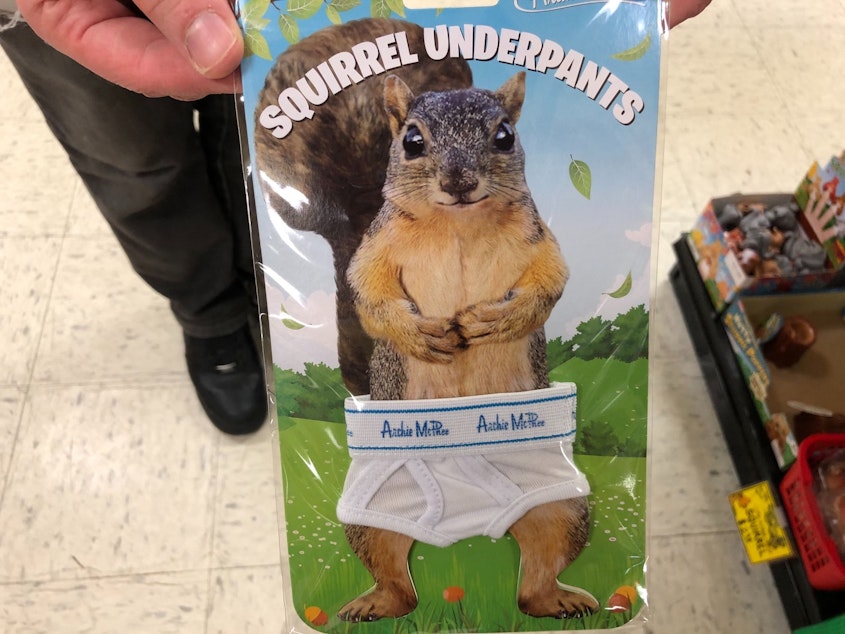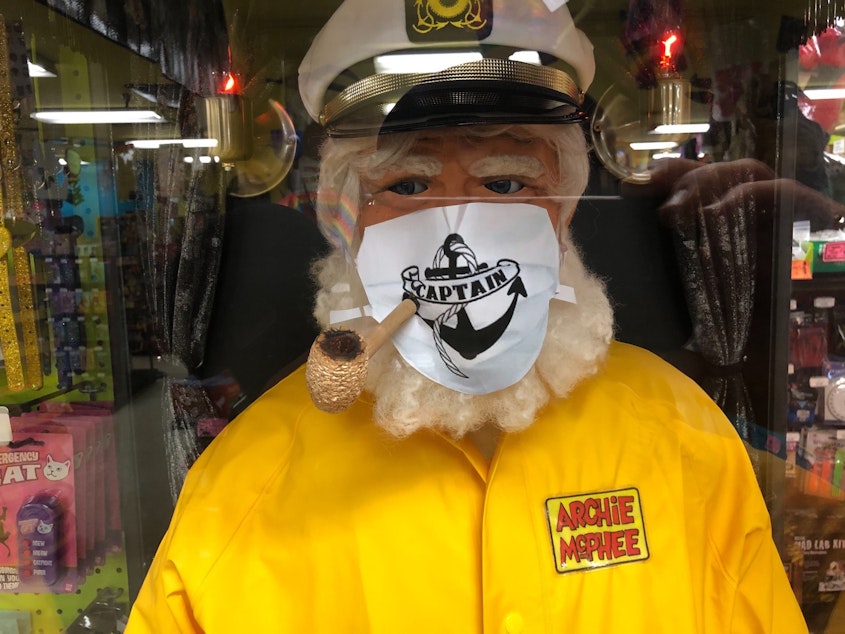Reopening stores highlight the joy of non-essential things

In King County, stores are reopening. Now, they just have to convince customers it's safe to return. We visited shops in Seattle's Wallingford neighborhood to see how that's going.
During the economic shutdown in Washington State, you could still buy many "essential" items in King County stores. Home Depot, for example, was full of cabin-fevered work-from-homers who suddenly had an essential need to build an office in the garage.
But there's nothing less essential than squirrel underpants. Because squirrels don't wear underpants.
Recognizing that, and out of concern for its employees and customers, Wallingford's novelty store Archie McPhee, purveyor of squirrel underpants and other similar products, had already closed when Jay Inslee gave the official order in March.
They offered curbside pickup, but it wasn't the same.
Now, customers wearing masks can walk in to Archie McPhee and other stores and experience the joy of non-essential things.
Sponsored
“We just have a whole bunch of interesting things that you only can get when you see the whole of the store,” said Roger Hutchins, the so-called "Duke of Doodads" at Archie McPhee. "There's a rubber chicken museum in back, and of course there's Cap'n Archie," the salty mechanical fortune teller trapped in a glass box. “And he also has a face mask because he’s staying safe and respecting the health and safety of everyone,” Hutchins said.

On the floor, tape reminds people to stay 6 feet apart. Customers are asked to limit themselves to 30 minutes, but Hutchins doesn't plan to enforce that (nor does the state's directive ask them to). They're limited to 15% capacity. Hutchins isn't sure how many customers that means, but they're keeping it to 10 customers at a time. Plexiglas shields protect customers and clerks from each other.
Hutchins says the store tried to stay engaged with customers over social media during the shutdown. It had its P.T. Barnum-style fake mummified creature known as "The Wallingford Beast" tweet out confessions like: "Day one of self-quarantine and I eat all of the bacon candy. Why am I like this?"
Sponsored
But on this first Monday afternoon of the new era of openness, there's only one woman and a young child in the store.
The busiest store in Wallingford on Monday afternoon was a surprising one: The Hawaii General Store.

So what is it about Hawaiian goods that customers suddenly needed after quarantining?
"You just happened to hit it at graduation and we sell fresh flower leis" said owner Gail Stringer. "The graduates and graduate parents are just a little tired of being disappointed. And leis are just one of those things that mean so much to so many people. People are just determined to get them.”
Sponsored
Seasonal lei sales are so important to this store, they make up "a ton" of its annual sales, Stringer said.
"It's the reason I opened the store in the first place, so it's a little tough when the big box stores sell them."
Sponsored
Big box stores, by selling essential items, have had the advantage of staying open during the shutdown. Now, small mom-and-pop stores like this one must try to catch up.
Stringer propped a folding table up sideways on the ground, like a baby-gate, to keep customers from waltzing in without noticing the mask requirement. Stringer said about half of customers don't arrive with masks on and are asked to return to their cars to get them.
This store stayed in business by delivering fresh poi to customers, and by aggressively seeking government relief. They received $28,000 from the federal government and $10,000 from the City of Seattle. These weren't enough to cover the store's losses, but they helped the staff, who quarantined together like family, Stringer said.
Not all businesses on this Wallingford street are seeing customers stream back in. Tae Park, owner of Sun Drive In Cleaners, can count his recent customers on one hand.
"So many people stay home working," he said, that nobody needs shirts and pants professionally cleaned.
Sponsored
Park didn't get any relief money, but says he's OK. He and his wife are the only employees right now, and they had enough money set aside to survive.
"Maybe next week, more people will come," he told me.

